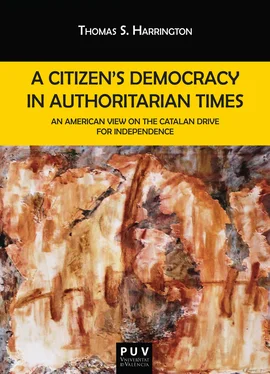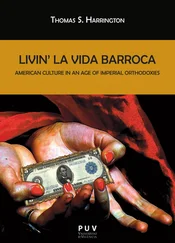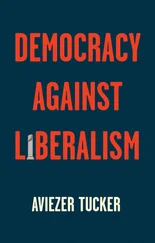A CITIZEN’S DEMOCRACY IN AUTHORITARIAN TIMES
AN AMERICAN VIEW ON THE CATALAN DRIVE FOR INDEPENDENCE
Thomas S. Harrington
Biblioteca Javier Coy d’estudis nord-americans
Universitat de València
BIBLIOTECA JAVIER COY D’ESTUDIS NORD-AMERICANS
http://puv.uv.es/biblioteca-javier-coy-destudis-nord-americans.html
http://bibliotecajaviercoy.com
DIRECTORAS
Carme Manuel (Universitat de València)
Elena Ortells (Universitat Jaume I, Castelló)
Esta publicación no puede ser reproducida, ni total ni parcialmente, ni registrada en, o transmitida por, un sistema de recuperación de información, de ninguna forma ni por ningún medio, sea fotomecánico, fotoquímico, electrónico, por fotocopia o por cualquier otro, sin el permiso de la editorial. Diríjase a CEDRO (Centro Español de Derechos Reprográficos, http://www.cedro.org) si necesita fotocopiar o escanear algún fragmento de esta obra.
© Thomas S. Harrington, 2019
© Universitat de València, 2019
ISBN: 978-84-9134-393-6
Digital edition
TABLE OF CONTENTS
Prologue
Rapping on the Cast(i)le Gates: Nationalism and Culture-Planning in Contemporary Spain
If a Million People March for Catalan Independence in Barcelona, Do They Make Noise?
“Washington Seeks Stability. It is Not Likely to Recognize a Catalan State”
The Essential Question of Our Time: “Will We Live as Citizens, or Go Back to Being Subjects?”
New National Structures Are Needed to Protect People Against Powerful Transnational Interests
Projecting Catalan Identity in the Contemporary World: A View from the Outside
Waiting for Positive Signs from the Great Powers is to Ratify Their Power Over You
No Centralist Power Will Allow Anyone to Leave Without Exacting a Price
Dignity Is an Important Word
Les Bases de Manresa: Where they Came From and Why They Are Important
Media Control and Authoritarian Rhetoric: How Spain’s Corrupt People’s Party Continues to Rule
An Interview with Catalan Independence Leader Artur Mas
A Nation Too Liquid?
As Long as The Front Against Negotiation Exists in Madrid, the Level of Alienation in Catalonia Will Grow
Urgent: Forced Takeover of Catalan Government Institutions by Spanish Police
Catalonia: Spanish Centralism or Self-Defeating Hubris of the Authoritarian Mind
Largest Newspaper in Spain Blames Russia and Antiwar.com for Catalonia Pro-Independence News
In the Midst of a Coup, Catalans Keep On Keepin’ On
Last Sunday in Catalonia: Pirates 1, The Invincible Armada 0
The Disingenuousness of the “Procedural Irregularities” Case Against Catalan Independence
Mario Vargas Llosa is the Perfect Poster Boy for Spanish Unionism
The Baseless Myth of the Poor, Propagandized Catalans
When Viewed in Comparative Terms, Catalonia’s Culture of Democracy is Truly Impressive
A Polemic with a Professor at the University of Connecticut
The Major Question Here is the Role of Force in Elective Democracies in the 21st Century
Catalonia and the Art of Differential Diagnosis
An Extraordinary Moment for Democracy in Europe
Big Media and Last Thursday’s (December 21st ) Vote in Catalonia: “Never Mind”
What Nerve! In Catalonia They Are Once Again Trying to Swear in the Coalition that Won the Most Votes
Rajoy and Catalonia: The Fear Behind the Bully’s Rage
Professor Marlene Wind: Symbol of a Smug Denmark and a Power-Serving Academic Discipline
Civil Disobedience: Myths and Realities
Brand Name Progressives in the US … and in Catalonia
When Spain Thought it Had Gained Promotion to the First Division of Lying States
The Establishment’s “Controversialization” of Quim Torra
Why Must Governments in Catalonia Please All When Those in Madrid Can Simply Enact Their Programs?
The Unionists in Catalonia Turn to the Latin American Coup Playbook
Prologue
It has been fascinating to watch how, in recent months and years, the meme of “fake news” has taken root in the public discourses of the US and Europe…and thoroughly demoralizing to observe how so many people charged, explicitly or implicitly, with nurturing the civic conversations essential to the functioning of our democracies have come to lazily, indeed flippantly, employ the term.
To question the veracity of a given element of the information environment around us is, of course, very legitimate. Indeed, it is much more than this. It is an essential duty of all citizens desirous of transcending the master-slave dynamic that has, sadly, served as the organizing template of most societies during human history. But as is the case with so many pursuits, the key lies in how you do it, or more precisely, the degree of care you bring to the task.
In the vast majority of the cases I have witnessed and read about, those using the term “fake news” have displayed virtually none of this attitude of careful circumspection. Rather, they have used the term as a cudgel for bludgeoning into a state of nullity ideas originating in political sub-cultures they have come, or have been taught, to distrust over time, that is, as a way of “winning” arguments without having to engage in the slow and arduous tasks of documentation and refutation.
The evil genius of the charge of “fake news” is that it allows one to be dismissively authoritarian regarding the views those you don’t like or trust while maintaining a pose of moral righteousness and civic probity. In this sense it is the intellectual first cousin of sweet-sounding but deadly concepts like “humanitarian intervention”, “US democracy promotion” and the drive to “protect free markets”.
In fact, the concept is flawed on an even more basic level.
To talk about “fake news” is to presume implicitly that there is “real news”, that is, that there exists information available to us that is free from slant or bias. But as anyone who has studied textual production in a serious fashion knows, or should know, there is no such thing. As Hayden White clearly demonstrated some four decades ago in his masterful “The Historical Text as Literary Artifact,” [1]the slightest change in narrative tone or the ordering of words, in a given utterance change its meaning dramatically. Put another way, all forms of news are inherently slanted or partial in nature, and therefore getting informed is always work in progress or, as they say in baseball, a matter of percentages.
But this, of course, is not what the busy denizens of a hustling and bustling consumer culture, flooded with an ever-expanding ocean of information, and raised on a steady diet of false promises of total satisfaction, want to hear.
Stressed from their busy lives they just want, as many people have said to me over the years, “someone to give it to them straight” in the same way that they want the newly purchased gadget from the electronics store to function correctly right out of the box. And when I tell them that this is tantamount to wanting to believe once again in a Santa Claus that slips down chimneys with bags full of toys, the conversation usually ends with a dispiriting thud.
What these people are saying with their silence is that, when it comes down to it, they really do not want spend that much of their scarce and valuable time engaging in the acts of discernment necessary to become a truly informed citizen.
So when someone of apparent knowledge and authority comes along a says X or Y is an agent of “fake news”, suggesting that they therefore that need not worry about parsing anything this person or entity says, they breathe a large sigh of relief. Why? Because their assigned task of civic discernment has just become immeasurably more simplified.
Thankfully, there are still certain places in this so-called Western world where this alarming drift toward citizen infantilization and apathy is being bucked.
Читать дальше












